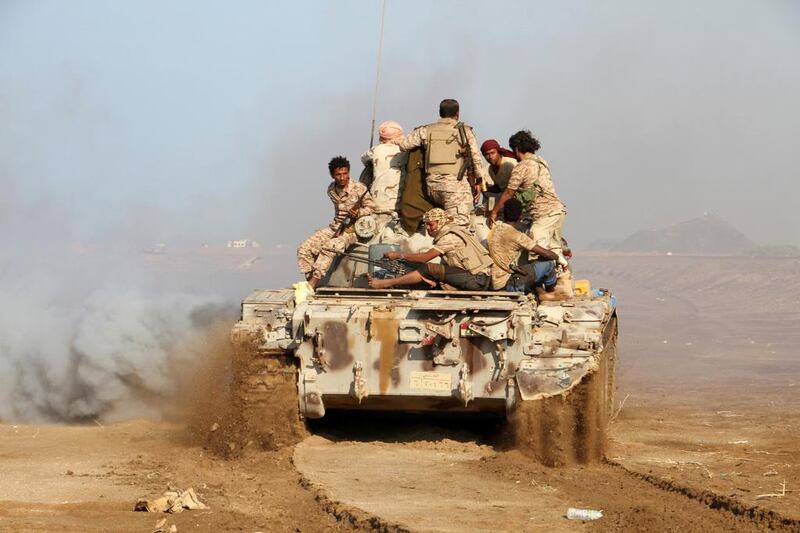ADEN // Dozens of soldiers and employees of the Houthi-run interior ministry took to the streets of Sanaa on Saturday morning, demanding their salaries which have gone unpaid for the last four months.
Protests are unusual in areas held by the Shiite rebels where demonstrations are banned.
A soldier who works at the interior ministry and took part in Saturday’s protest told The National the Houthis threatened to shoot demonstrators after they blocked the road leading to Sanaa’s airport.
“The Houthis tried to end the protest by threatening us with their Kalashnikovs, but as soldiers we did not fear their weapons and so did not leave the street until noon,” he said.
Public sector salaries have been affected in rebel-held areas since the country’s internationally-recognised president, Abdrabu Mansur Hadi, moved the central bank from Sanaa to the temporary capital of Aden in June, accusing the Houthis of running down Yemen’s foreign reserves.
Since then the rebels have refused to send the incomes of provinces under their control – which are mainly made up of taxes – to the central bank in Aden. Without these funds, for the past four months Mr Hadi’s government has said it is unable to pay the wages of public sector employees in Houthi-held areas.
On Saturday, however, prime minister Ahmed bin Dagher said his Aden-based administration would begin transferring salaries to state employees in areas controlled by the rebels.
According to the state-run Saba news agency, Mr bin Dagher said government workers “across all provinces” would receive their salaries at post offices and exchange outlets, although it was not clear when exactly this would be.
The interior ministry soldier who spoke to The National warned that if employees did not receive their salaries in the next few days the demonstrators would escalate their protests and “may set up tents in the street”.
The majority of employees at state-run institutions have continued to turn up for work despite not being paid, with only workers at some universities, including Sanaa University, going on strike in protest.
“The salary is the right of our children and we cannot [make enough money to feed our families without it], so we have to fight for it – otherwise our children will starve to death,” the interior ministry soldier said.
The dispute over salaries has been taking place against the backdrop of Yemen’s civil war, which began in September 2014 when the Houthis captured Sanaa, forcing the government to relocate to Aden. The government is being supported in its battle against the rebels by a Saudi-led military coalition of mainly Arab countries.
An overnight air strike by the coalition on a rebel gathering in the western port city of Hodeidah killed nine Houthis, a security official said. The city, which is the capital of Hodeidah province, is controlled by the rebels.
The strike came as government forces and allied fighters continued their week-long advance in the Dhubab region of Taez province, close to the Bab Al Mandeb strait which links the Red Sea and Indian Ocean.
The bodies of 12 Houthis were taken to a hospital in Hodeidah following clashes in Dhubab on Friday night, a medical official said, adding that the facility also admitted 23 wounded rebels. Hodeidah lies some 200 kilometres north of Dhubab.
A medical official at a hospital in Aden, meanwhile, said five pro-government fighters were killed and 14 others wounded in the clashes.
Forces loyal to Mr Hadi and allied fighters from the Popular Resistance have entered the town of Dhubab and seized its local government headquarters.
Popular Resistance commander Abdelrahman Al Muharami said the loyalists had also recaptured large parts of Al Omeri military base in mountains overlooking the coast, but warned there were still some rebel pockets in the base.
On Thursday the Emirates Red Crescent provided 2,700 parcels of food aid to families in the Bab Al Mandeb area who are facing dire economic conditions, state news agency Wam reported on Saturday.
The government and its allies recaptured Bab Al Mandab in October 2015, pushing the rebels further north. But the Houthis still control nearly all of Yemen’s Red Sea coast to the north, posing what the coalition says is a threat to international shipping.
Also on Friday, the Pentagon said a US air strike had killed a senior regional Al Qaeda operative in the central Yemeni province of Baida.
The January 8 strike killed Abd Al Ghani Al Rasas, said Pentagon press secretary Peter Cook.
foreign.desk@thenational.ae
* With additional reporting by Agence France-Presse





